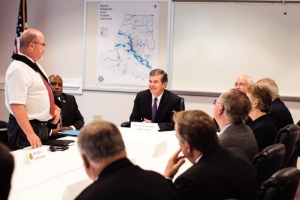Cooper: Lack of affordable housing hindered hurricane recovery
By Steve Herring
Published in News on April 21, 2017 7:59 AM

News-Argus/SETH COMBS
Gov. Roy Cooper greets Goldsboro City Councilman Antonio Williams at the Jeffrey's Building. Cooper stopped in Goldsboro on Thursday to sit down with local government officials and assess issues concerning Hurricane Matthew aftermath.

News-Argus/SETH COMBS
Chairman Bill Pate stands to welcome Gov. Roy Cooper during a meeting the addressing Hurricane Matthew recovery efforts yesterday at the Jeffrey's building.
A lack of affordable housing in Wayne County and across eastern North Carolina has hindered efforts to relocate people who lost their homes because of Hurricane Matthew, Gov. Roy Cooper said.
The storm put a spotlight on things that leaders knew, but that the public at large might not have known -- more specifically the lack of affordable housing in rural North Carolina, Cooper said during a Thursday afternoon stop in Goldsboro.
"So what we want to do in this recovery process is to be even broader than addressing just the damage from Hurricane Matthew," Cooper told leaders from across Wayne County.
That includes recognizing the issues regarding affordable housing and that there is a need to create more opportunities for housing, he said.
Some companies in the affordable housing business have said it is not worth it and are walking away, Cooper said.
"It is difficult to find places for people to live that are affordable," Cooper said. "People need that help. They need assistance with down payments, advanced rent and finding those places.
"But also long term we need to find affordable housing solutions so we have requested more money from the federal government, just under $1 billion. We are waiting for that result."
Cooper met with local leaders the county's emergency operations center for roundtable discussion to hear concerns, unmet needs and ideas on the state's efforts to help communities recover from the devastation of Hurricane Matthew in October.
He brought with him the Secretary of Public Safety Erik Hooks, Dempsey Benton, hurricane recovery director, and Mike Sprayberry, the state's emergency management director.
Several Federal Emergency Management Agency officials, including, Federal Coordinating Officer Libby Turner, attended the meeting.
Cooper and the local leaders zeroed in on the need for affordable housing -- both now and in the future.
Wayne County Manager George Wood told Cooper that 23 Wayne County families are still dislocated and that nine are receiving temporary housing assistance. Also, 14 families are in FEMA trailers in the county, he said.
"Like you said, we need to try to get them relocated as soon as possible," Wood said.
The county is pursing the housing buyout and elevation programs, he said. Currently the buyout proposal includes 300 properties valued a $31.8 million with plans to elevate 23 single-family homes at a cost of $3.9 million.
City Manager Scott Stevens said he was in Kinston in 1999 when Hurricane Floyd caused major flooding.
After Floyd, 700 properties that flooded were bought out and as such there were no homes or businesses on them to be affected by the most the most recent flood, he said.
"Whatever possible that can be done should be done to help get people out of the flood plain," he said.
Cooper also stressed the importance of learning from the storm with one such lesson being getting and keeping homes and businesses out of flood plains to prevent such devastation from happening in the future.
Both Stevens and Wood said they know that recovery efforts, such as the buyouts, is a lengthy process, but that they would like to see some way to speed it up.
Cooper said the county, Goldsboro and Seven Springs had been so hard but the cooperation had strengthen residents and shows how strong and resilient residents are.
The state's rebuilding plan will focus on resiliency and ways to help lessen the severity of the next storm, Cooper said.
Hurricane Matthew caused $4.8 billion in damages across the state's 50 hardest-hit counties.
More money has been requested from the General Assembly as well as from Congress, Cooper said.
But the state is "kind of waiting" to see what the federal government is going to do, Cooper said.
The request for federal funding had to be pared down, but it is a reasonable and valid one that is well researched and well presented, Cooper said.
The governor said he is hopeful the request will be funded, but that getting Congress to do anything these days with the issues it is facing, and the political turmoil it is in, makes the request "tenuous."
"I hope can see through partisanship and get help to the people who need it," he said.
Cooper encouraged those at the meeting to contact their congressional representatives to lobby to support the state's funding request.
"We have also put forth a plan of how we are going to invest the money that has already been appropriated," he said.
Most of that money will go to the four hardest hit counties -- Wayne, Robeson, Cumberland and Edgecombe, he said.
Those counties will share $159 million of the $198 million grant awarded by the U.S. Department of Housing and Urban Development to support housing, economic development, infrastructure and efforts to prevent further damage.
The state's Disaster Recovery Act of 2016 requires all affected communities to develop or enhance resiliency planning, Seven Springs is one of six communities participating in a pilot project that provides additional resources.
Seven Springs Mayor Stephen Potter was at the meeting and outlined the town's plans to pursue development of a recreational area to help it survive.
During a press conference following the meeting, Cooper said the people leaving the affordable housing business need to be encouraged to return while encouraging others to go into the business.
He praised how county residents have come together to face adversity during and in the aftermath of the storm.
Cooper called the people of Wayne County resilient and said he believes they will come back even stronger than ever.
But they need help from the state government, federal government and the help of everyone in the community including nonprofits, people of faith and others, he said.
"A lot of people are still hurting, and we have to help them," he said. "I think that the message that we got from Wayne County is that they were grateful for the help from the state in the initial stages of this recovery.
"They told me about how they were able to work together to save a lot of lives of people who were in peril during the early hours of the storm. But they have also presented to us the challenges in recovery, getting help for small businesses trying to get back on their feet, getting help for families that are still displaced, getting help for infrastructure and planning for the next disaster."
It is important to learn from disasters like Hurricane Matthew, Cooper said.
"So recovery has to be smart and I heard from them they are ready to work with us to make this community even better," he said.
